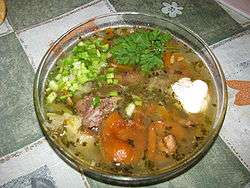
Shchi
Shchi (Russian: щи; IPA: [ɕːi]) is a Russian style of cabbage soup. When sauerkraut is used instead, the soup is called sour shchi, while soups based on sorrel, spinach, nettle, and similar plants are called green shchi (Russian: зелёные щи, zelyoniye shchi). In the past, the term sour shchi was also used to refer to a drink, a variation of kvass, which was unrelated to the soup.
History
Shchi is a traditional soup of Russia where it has been known as far back as the 9th century, soon after cabbage was introduced from Byzantium. Its popularity in Russia originates from several factors. Shchi is relatively easy to prepare; it can be cooked with or without various types of meat; and it can be frozen and carried as a solid on a trip to be cut up when needed. Finally, it was noticed that most people do not get sick of shchi and can eat it daily. As a result, by the 10th century shchi became a staple food of Russia, and another popular saying sprang from this fact: "Щи да каша — пища наша." (Shchi da kasha — pishcha nasha "Shchi and kasha are our food"). The major components of shchi were originally cabbage, meat (beef, pork, lamb, or poultry), mushrooms, flour, and spices (based on onion and garlic). Cabbage and meat were cooked separately and smetana was added as a garnish before serving. Shchi is traditionally eaten with rye bread.

